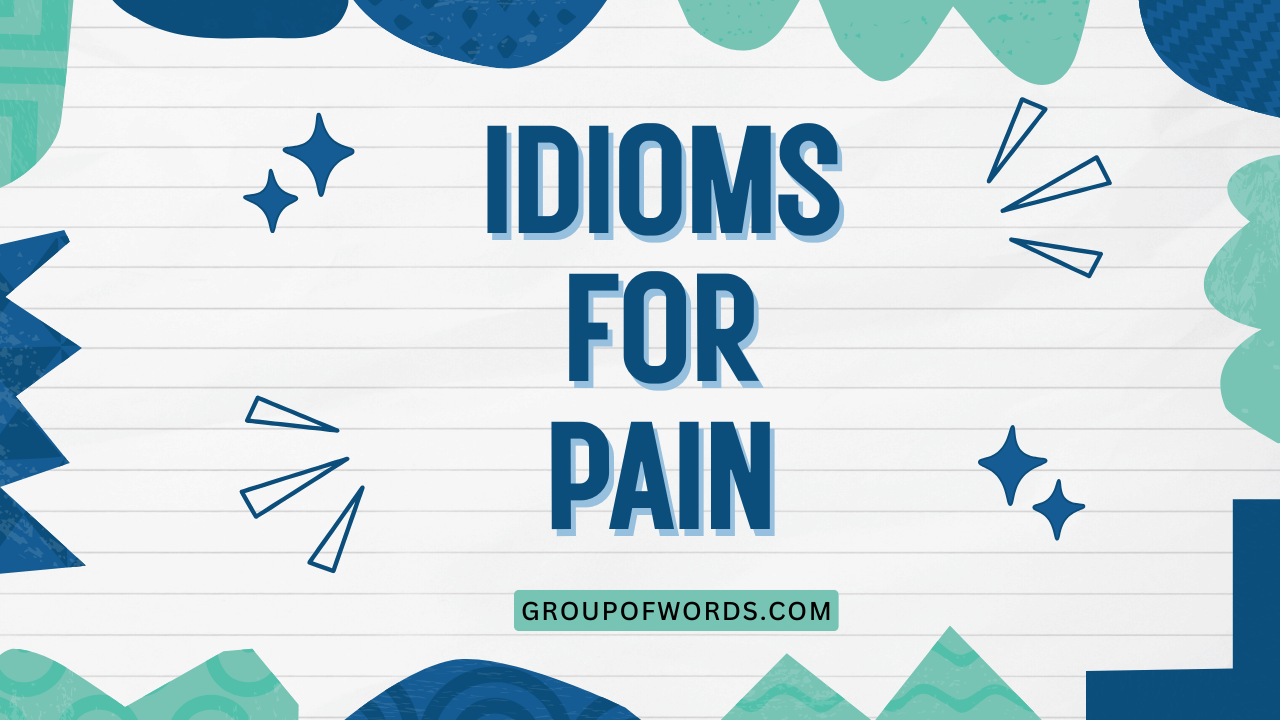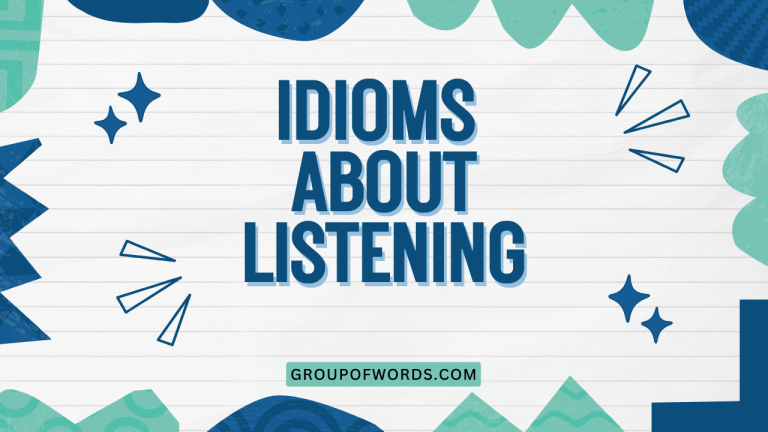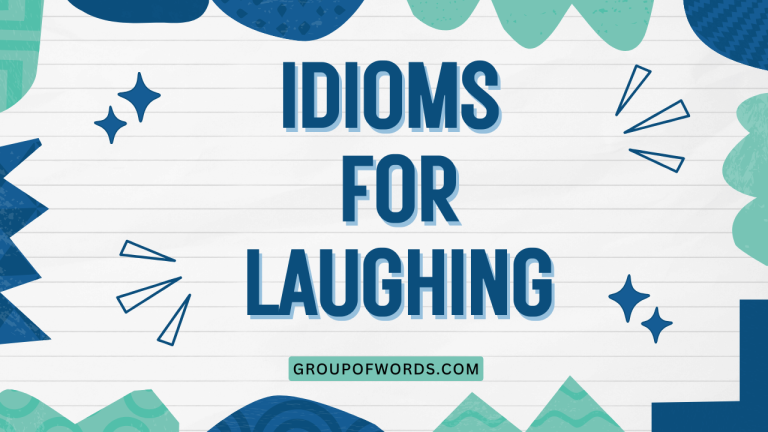Idioms for Pain: Expressing Discomfort in English
Understanding idioms is crucial for mastering English, as they add color and nuance to everyday conversations. This article focuses on idioms related to pain, both physical and emotional.
Learning these idioms will not only expand your vocabulary but also enhance your ability to understand and express a wide range of experiences. This guide is perfect for ESL students, language enthusiasts, and anyone looking to improve their grasp of idiomatic English.
By the end of this article, you’ll be equipped with a rich collection of pain-related idioms, complete with examples, usage rules, and practice exercises.
Let’s dive in and explore the fascinating world of idioms for pain!
Table of Contents
- Introduction
- Definition of Idioms and Their Role
- Structural Breakdown of Idioms
- Types of Pain and Related Idioms
- Examples of Idioms for Pain
- Usage Rules for Idioms
- Common Mistakes When Using Idioms
- Practice Exercises
- Advanced Topics: Nuances and Regional Variations
- Frequently Asked Questions
- Conclusion
Definition of Idioms and Their Role
An idiom is a phrase or expression whose meaning cannot be understood from the literal meanings of its individual words. Instead, idioms have a figurative meaning that is culturally specific.
They are an integral part of any language, adding depth, color, and expressiveness to communication. Understanding idioms is essential for achieving fluency and comprehending nuanced conversations.
Idioms play several crucial roles in language:
- Enhance Communication: They allow for more vivid and concise expression.
- Reflect Culture: They often carry cultural and historical significance.
- Improve Comprehension: Understanding idioms is key to understanding native speakers.
- Add Personality: They can make your speech more engaging and relatable.
In the context of pain, idioms provide a way to describe discomfort and suffering in a more nuanced and relatable manner. Instead of simply saying “I am in pain,” you can use idioms to convey the intensity, nature, and impact of the pain.
Structural Breakdown of Idioms
Idioms, unlike regular phrases, don’t follow the typical rules of compositionality. This means you can’t understand the idiom’s meaning by simply adding up the meanings of its individual words.
Instead, you need to learn each idiom as a single unit of meaning.
Here’s a breakdown of the structural elements commonly found in idioms:
- Fixed Structure: Idioms often have a fixed word order, and changing this order can alter or destroy the idiom’s meaning.
- Figurative Language: They frequently use metaphors, similes, and other figures of speech.
- Non-Compositionality: The meaning of the whole is different from the sum of the parts.
- Cultural Context: Understanding the cultural context is essential for interpreting idioms correctly.
For example, the idiom “a pain in the neck” doesn’t literally mean a pain located in the neck. Instead, it figuratively means someone or something that is annoying or troublesome.
The structure is fixed; you can’t say “the neck in a pain” and retain the same meaning. The figurative language uses the idea of physical discomfort to represent annoyance.
Types of Pain and Related Idioms
Pain can manifest in various forms, each with its own set of associated idioms. We can broadly categorize pain into three main types: physical, emotional, and mental.
Physical Pain
Physical pain refers to discomfort or suffering experienced in the body. This can range from minor aches and pains to severe, debilitating conditions.
Idioms related to physical pain often use vivid imagery to describe the intensity and nature of the sensation.
Examples of physical pain idioms include:
- A pain in the neck: Something or someone annoying.
- Feel like death warmed over: Feeling extremely ill.
- Under the weather: Feeling slightly unwell.
Emotional Pain
Emotional pain refers to the suffering and distress caused by negative emotions such as sadness, grief, disappointment, or heartbreak. These idioms often use metaphors related to physical injury or sickness to convey the intensity of the emotional experience.
Examples of emotional pain idioms include:
- Heartbroken: Experiencing intense sadness due to the end of a relationship or a significant loss.
- A bitter pill to swallow: A difficult or unpleasant situation that must be accepted.
- Cut to the quick: To deeply hurt someone’s feelings.
Mental Pain
Mental pain refers to the suffering and distress caused by cognitive or psychological issues such as stress, anxiety, or mental illness. These idioms often describe feelings of overwhelm, confusion, and exhaustion.
Examples of mental pain idioms include:
- At wit’s end: Feeling so stressed or overwhelmed that you don’t know what to do.
- Driving me up the wall: Annoying or irritating someone intensely.
- Banging your head against a brick wall: Trying to do something impossible or pointless.
Examples of Idioms for Pain
Let’s explore some specific examples of idioms related to pain, categorized by the type of pain they describe.
Physical Pain Examples
The following table provides examples of idioms used to describe physical pain, along with their meanings and example sentences.
| Idiom | Meaning | Example Sentence |
|---|---|---|
| A pain in the neck | Someone or something annoying or troublesome. | My little brother is such a pain in the neck when I’m trying to study. |
| Feel like death warmed over | Feeling extremely ill. | After catching that flu, I felt like death warmed over for a week. |
| Under the weather | Feeling slightly unwell. | I’m feeling a bit under the weather today, so I’m going to stay home from work. |
| Black and blue | Covered in bruises. | After the accident, his legs were black and blue. |
| Out of shape | Not physically fit. | I’m so out of shape; I get winded just walking up the stairs. |
| Run down | Tired and lacking energy. | I’ve been feeling run down lately, I think I need a vacation. |
| Kick the bucket | To die (informal). | He finally kicked the bucket after a long illness. |
| At death’s door | Very close to dying. | The patient was at death’s door when they arrived at the hospital. |
| Not feeling up to snuff | Not feeling well or performing well. | I’m not feeling up to snuff today so I’m going to take it easy. |
| Like a bear with a sore head | In a very bad mood, irritable. | He’s like a bear with a sore head this morning, I wonder what’s wrong. |
| On your last legs | Near the end of life or usefulness. | This old car is on its last legs; it will probably break down soon. |
| In a bad way | In poor health or in a difficult situation. | After the surgery, he was in a bad way for several days. |
| In poor shape | In bad physical condition. | The old building was in poor shape and needed to be renovated. |
| Have a frog in your throat | Have difficulty speaking because your throat is dry or irritated. | I have a frog in my throat this morning; I need to drink some water. |
| Bedridden | Confined to bed due to illness or injury. | She has been bedridden since her accident. |
| Give someone a pounding | To beat someone severely. | The boxer gave his opponent a pounding in the ring. |
| Take a beating | To suffer a defeat or severe damage. | The stock market took a beating during the financial crisis. |
| Hit below the belt | To do or say something unfair or hurtful. | Criticizing his family was a hit below the belt. |
| No picnic | Not easy or pleasant. | Recovering from surgery is no picnic. |
| Hard to swallow | Difficult to accept or believe. | The news of the layoffs was hard to swallow. |
| Not long for this world | Not expected to live much longer. | The doctor said he wasn’t long for this world. |
| At the end of your rope | Having no more patience or energy to deal with something. | She was at the end of her rope after dealing with her unruly children all day. |
| Laid up | Unable to work or be active due to illness or injury. | He’s been laid up with a broken leg for the past month. |
| On the mend | Recovering from an illness or injury. | She’s on the mend after her surgery and should be back to work soon. |
This table illustrates how idioms can vividly depict physical discomfort and illness, adding depth to your descriptions.
Emotional Pain Examples
This section provides examples of idioms used to describe emotional pain, along with their meanings and example sentences.
| Idiom | Meaning | Example Sentence |
|---|---|---|
| Heartbroken | Experiencing intense sadness due to loss or disappointment. | She was heartbroken when her boyfriend broke up with her. |
| A bitter pill to swallow | A difficult or unpleasant situation that must be accepted. | Losing the competition was a bitter pill to swallow. |
| Cut to the quick | To deeply hurt someone’s feelings. | His harsh words cut her to the quick. |
| Down in the dumps | Feeling sad or depressed. | She’s been down in the dumps ever since she lost her job. |
| Have a heavy heart | Feeling sad or burdened by sorrow. | I have a heavy heart knowing that I have to move away from my friends. |
| Cry your eyes out | To cry intensely for a long time. | She cried her eyes out after watching the sad movie. |
| A stab in the back | An act of betrayal by someone you trusted. | He felt it was a stab in the back when his colleague took credit for his work. |
| Bury your sorrow | To try to forget sadness or grief. | He tried to bury his sorrow by working long hours. |
| Sing the blues | To feel sad or depressed. | She’s been singing the blues ever since she failed the exam. |
| Wear your heart on your sleeve | To openly show your emotions. | He wears his heart on his sleeve, so everyone knows when he’s upset. |
| A weight off your shoulders | A relief from worry or burden. | Getting the project finished was a weight off my shoulders. |
| Fall apart | To become emotionally unstable or break down. | She fell apart after hearing the news of the accident. |
| Hit rock bottom | To reach the lowest point in a difficult situation. | He hit rock bottom when he lost his house and his job. |
| A broken record | Someone who repeats the same complaint or story over and over. | She sounds like a broken record complaining about her ex-boyfriend. |
| Inconsolable | Unable to be comforted. | She was inconsolable after the death of her pet. |
| A lump in your throat | A feeling of tightness in the throat caused by strong emotion. | I had a lump in my throat when I said goodbye to my family. |
| Have a chip on your shoulder | To be resentful or angry due to past experiences. | He has a chip on his shoulder because he feels he was treated unfairly. |
| Wallowing in self-pity | Indulging in feelings of sadness and hopelessness. | She spent the whole weekend wallowing in self-pity after being rejected. |
| On the verge of tears | About to cry. | She was on the verge of tears when she heard the bad news. |
| Bite the bullet | To face a difficult situation with courage. | I had to bite the bullet and tell him the truth. |
| Pick up the pieces | To recover from a difficult situation. | After the disaster, the community had to pick up the pieces and rebuild. |
| A cloud hanging over your head | A feeling of worry or sadness that lingers. | The threat of layoffs put a cloud hanging over everyone’s head. |
| Get something off your chest | To express something that has been bothering you. | I need to get something off my chest; I’ve been feeling guilty about lying to you. |
| Let your hair down | To relax and enjoy yourself without worrying. | After a stressful week, it’s good to let your hair down and have some fun. |
This table provides a comprehensive look at how emotional pain can be expressed through vivid and relatable idioms.
Mental Pain Examples
This section provides examples of idioms used to describe mental pain, along with their meanings and example sentences.
| Idiom | Meaning | Example Sentence |
|---|---|---|
| At wit’s end | Feeling so stressed or overwhelmed that you don’t know what to do. | I’m at my wit’s end trying to solve this problem. |
| Driving me up the wall | Annoying or irritating someone intensely. | His constant complaining is driving me up the wall. |
| Banging your head against a brick wall | Trying to do something impossible or pointless. | Trying to convince him is like banging your head against a brick wall. |
| Pulling your hair out | Feeling extremely frustrated or stressed. | I’m pulling my hair out trying to meet this deadline. |
| Losing your mind | Becoming mentally unstable or irrational. | The stress of the situation is making me feel like I’m losing my mind. |
| On edge | Feeling nervous or anxious. | I’ve been on edge all day waiting for the test results. |
| Stressed out | Feeling overwhelmed by stress. | I’m so stressed out with all the work I have to do. |
| Going bananas | Becoming crazy or irrational. | The crowd went bananas when the band came on stage. |
| Out of your mind | Crazy or irrational. | You must be out of your mind to drive that fast. |
| Scatterbrained | Disorganized and forgetful. | She’s so scatterbrained; she always forgets where she puts her keys. |
| Off your rocker | Crazy or eccentric. | He must be off his rocker to think that’s a good idea. |
| Brain is fried | Mentally exhausted. | After studying all night, my brain is fried. |
| Going stir-crazy | Feeling restless and anxious from being confined. | I’m going stir-crazy being stuck inside all day. |
| Mind-numbing | Extremely boring or tedious. | The repetitive work was mind-numbing. |
| A nervous wreck | Extremely anxious or stressed. | She was a nervous wreck before her presentation. |
| Head is spinning | Feeling confused or overwhelmed. | My head is spinning trying to understand all the new information. |
| Can’t think straight | Unable to think clearly due to stress or confusion. | I can’t think straight when I’m under pressure. |
| Up the wall | Very annoyed or frustrated. | The noise from the construction is driving me up the wall. |
| Loosing it | Becoming extremely upset or losing control. | She started losing it when she realized she had lost her passport. |
| Beside myself | Overwhelmed with emotion, often anger or worry. | I was beside myself with worry when my child didn’t come home on time. |
| Crack under pressure | To fail or break down due to stress. | He cracked under pressure during the final exam. |
| Space out | To become distracted or lose focus. | I tend to space out during long meetings. |
| On the brain | Thinking about something constantly. | I’ve had that song on the brain all day. |
| Running around like a headless chicken | Acting in a frantic and disorganized way. | She was running around like a headless chicken trying to get everything done. |
This table illustrates the various ways in which idioms can vividly express mental distress and cognitive challenges.
Usage Rules for Idioms
Using idioms correctly requires understanding their specific meanings and contexts. Here are some general rules to keep in mind:
- Context is Key: Pay attention to the context in which the idiom is used. The same idiom can have different meanings in different situations.
- Fixed Structure: Most idioms have a fixed structure, and altering the word order can change or destroy their meaning.
- Figurative Meaning: Remember that idioms have a figurative, not literal, meaning.
- Audience Awareness: Be mindful of your audience. Some idioms may be unfamiliar to non-native speakers or inappropriate in formal settings.
- Practice: The best way to learn idioms is through exposure and practice. Read widely, listen to native speakers, and try using idioms in your own speech and writing.
For example, consider the idiom “a pain in the neck.” You wouldn’t use this idiom in a formal business presentation. Instead, you might use it in a casual conversation with friends to describe an annoying coworker.
Common Mistakes When Using Idioms
Using idioms incorrectly can lead to confusion or miscommunication. Here are some common mistakes to avoid:
| Incorrect | Correct | Explanation |
|---|---|---|
| I’m feeling under the climate. | I’m feeling under the weather. | “Under the weather” is the correct idiom for feeling unwell. |
| She was heart-broke. | She was heartbroken. | “Heartbroken” is the correct word. |
| He’s driving me on the wall. | He’s driving me up the wall. | “Driving me up the wall” is the correct idiom for annoying someone. |
| I have a heavy head. | I have a heavy heart. | “Heavy heart” refers to emotional sadness. |
| Bite the music. | Bite the bullet. | “Bite the bullet” means to face a difficult situation. |
| Pull my hair out. | Pulling my hair out. | The correct form is “pulling my hair out” to show you are feeling extremely frustrated or stressed. |
| At my wit’s endness. | At wit’s end. | “At wit’s end” is the correct idiom. |
| On the edge. | On edge. | “On edge” is the correct idiom for feeling nervous or anxious. |
| She told me a stab on the back. | She gave me a stab in the back. | The correct idiom is “a stab in the back”. |
| I’m feeling a weight off my head. | I’m feeling a weight off my shoulders. | The correct idiom is “a weight off my shoulders”. |
By being aware of these common mistakes, you can avoid misusing idioms and communicate more effectively.
Practice Exercises
Test your understanding of idioms for pain with these practice exercises.
| Question | Answer |
|---|---|
| 1. After failing the exam, she was feeling ______. | down in the dumps |
| 2. My neighbor’s loud music is ______ me ______. | driving, up the wall |
| 3. He had to ______ and tell her the truth. | bite the bullet |
| 4. After working all night , my ______ is ______. | brain, fried |
| 5. She was ______ when her dog died. | heartbroken |
| 6. I’m ______ trying to finish this project on time. | pulling my hair out |
| 7. He is recovering from his illness, he is ______ . | on the mend |
| 8. I had to ______ the news that my application was rejected. | swallow |
| 9. After a long day of work, I just want to ______ . | let my hair down |
| 10. He didn’t get the promotion, so he has ______ . | a chip on his shoulder |
Exercise 2: Choose the correct idiom to complete each sentence.
| Question | Answer |
|---|---|
| 1. The constant delays were ______ to deal with. (a pain in the neck / a piece of cake) | a pain in the neck |
| 2. After the breakup, she spent weeks ______. (singing the blues / painting the town red) | singing the blues |
| 3. With all the problems, I feel like I’m ______. (at wit’s end / on top of the world) | at wit’s end |
| 4. After the criticism, he felt ______. (cut to the quick / over the moon) | cut to the quick |
| 5. The news of the layoffs was ______. (a bitter pill to swallow / a walk in the park) | a bitter pill to swallow |
| 6. I’ve had that song ______ all day. (on the brain / in my ear) | on the brain |
| 7. After the surgery, she was ______. (black and blue / hale and hearty) | black and blue |
| 8. He’s been ______ since his accident. (laid up / up and about) | laid up |
| 9. After a stressful week, it’s time to ______. (let your hair down / keep your hair on) | let your hair down |
| 10. She was ______ before her presentation. (a nervous wreck / cool as a cucumber) | a nervous wreck |
Exercise 3: Match the idiom with its meaning.
| Idiom | Meaning | Answer |
|---|---|---|
| 1. Feel like death warmed over | a. Feeling extremely frustrated | 1-b |
| 2. Pulling your hair out | b. Feeling extremely ill | 2-a |
| 3. A stab in the back | c. Recovering from an illness | 3-e |
| 4. A heavy heart | d. Annoying or troublesome | 4-f |
| 5. On the mend | e. An act of betrayal | 5-c |
| 6. A pain in the neck | f. Feeling sad | 6-d |
Advanced Topics: Nuances and Regional Variations
Idioms can have subtle nuances and variations depending on the region or dialect of English. Some idioms may be more common in British English than in American English, while others may have different connotations depending on the cultural context.
For example, the idiom “gutted” is commonly used in British English to describe feeling extremely disappointed or upset. While it’s understood in American English, it’s not as widely used.
Similarly, the idiom “a bad egg” is more common in some regions than others.
Additionally, the intensity of an idiom can vary depending on the context. For example, saying “I’m a little under the weather” implies a mild illness, while saying “I feel like death warmed over” suggests a much more severe condition.
Understanding these nuances and regional variations can help you use idioms more accurately and effectively.
Frequently Asked Questions
- What is the difference between an idiom and a proverb?
An idiom is a phrase whose meaning is different from the literal meanings of its individual words, while a proverb is a short, well-known saying that expresses a general truth or piece of advice. Idioms are more about figurative language, while proverbs are more about wisdom and guidance.
- How can I learn idioms effectively?
The best way to learn idioms is through exposure and practice. Read widely, listen to native speakers, watch movies and TV shows, and try using idioms in your own speech and writing. Keep a notebook of new idioms and review them regularly.
- Are idioms important for learning English?
Yes, idioms are essential for achieving fluency and understanding nuanced conversations. They add depth, color, and expressiveness to the language.
- Can I translate idioms literally?
No, idioms should not be translated literally, as their meaning is figurative and culturally specific. Literal translations will often be nonsensical or misleading.
- Are there different types of idioms?
Yes, idioms can be categorized based on their structure, function, or the topic they relate to. For example, there are idioms related to animals, food, weather, and emotions.
- How do I know when to use an idiom?
Consider the context, your audience, and the level of formality. Idioms are generally more appropriate in informal settings and with people who are familiar with the language.
- Is it okay to use idioms in formal writing?
In general, it’s best to avoid idioms in formal writing, as they can sound too casual or colloquial. However, there may be exceptions depending on the specific context and purpose of the writing.
- What should I do if I don’t understand an idiom?
Ask for clarification! Don’t be afraid to ask a native speaker or consult a dictionary or online resource. Understanding the context is key to deciphering the meaning of an idiom.
Conclusion
Mastering idioms for pain is a valuable step in enhancing your English language skills. By understanding the nuances and usage rules of these expressions, you can communicate more effectively and expressively.
Remember to practice regularly, pay attention to context, and be mindful of your audience. Embrace the challenge of learning idioms, and you’ll find that your English becomes richer, more colorful, and more engaging.
Keep exploring, keep practicing, and keep expanding your vocabulary. With dedication and effort, you’ll become a master of idiomatic English in no time!






